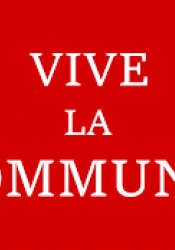The Paris Commune
The Paris Commune was a 71 day socialist uprising in the heart of Paris, France. The preceeding half century up to this point, the Parisians became more and more discontent with the way the French government operated. Despite their attempts to shift the discourse to the left by overthrowing the Orleanist monarchy and replacing it with the second French Republic, Napoleon III seized power and announced the creation of the second French Empire. Parisians grew in anger and a revolutionary fire began to burn in their hearts. They all agreed that the monarchy must go, but many had shifted all the way into anarchist and/or Marxist extremism. So when the Franco-Prussian War erupted, they had no support from the Monarch to protect them.
Paris was essentially left defenceless. The wealthy all fled the city before Prussian siege began. Many Parisians began to starve. Paris was left destitute after the war and daily protests plagued the city for weeks. Being abandoned by its governing body meant that Paris was directly controlled by the main French Government. So the Parisians, desiring more local governance, appointed their own city council. The Paris Commune was born.
While they never directly declared independence from France, the laws that the Paris City Council passed were in direct opposition to the president of France, Adolphe Thier’s strict economic regulations. Additionally, many of the laws that the Paris Council passed were reflective of Leftist ideology, and for this reason it is memorialized in history as one of the first attempts at a socialist society. Among their legislation were the following: The separation of church and state, the abolishment of death penalty, and ending conscription.
There was also several large women’s movement that emerged place during this time, and much of the commune had a foundation in a struggle against capitalism and the patriarchy. Though, much of the struggle would never be fully realized due to the short time the Commune lasted. Nathalie Lemel created the Women’s Union for the Defence of Paris and Care of the Wounded. Elisabeth Dmitrieff created The Union des Femmes which brought women more control over their own labor and demanded equality of wages for women.
However, despite all these large steps, the Commune never nationalised anything. In fact, one of the biggest Leftist criticisms of the Commune is that the Parisians worked together with the bank of France located in Paris, rather than raid and steal all the gold.
Eventually, Thier amassed an army that could take back Paris and over the course of The Bloody Week.
Works Cited:
Hoffenberg, Peter H. “1871-1874: The South Kensington International Exhibitions.” BRANCH: Britain, Representation and Nineteenth-Century History. Ed. Dino Franco Felluga. Extension of Romanticism and Victorianism on the Net. Web. 9 Oct 2020
Eichner, Carolyn Jeanne. Surmounting the Barricades Women in the Paris Commune. Bloomington: Indiana UP, 2004. Web. 8 Oct 2020
Merriman, John M. Massacre : The Life and Death of the Paris Commune. 2014. Web. 8 Oct 2020

